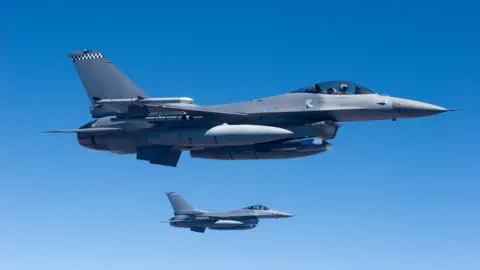Ukraine war: Western allies send Kyiv mixed messages on war planes
 Getty Images
Getty ImagesUS President Joe Biden has ruled out providing F-16 fighter jets to Ukraine, despite renewed calls from top Kyiv officials for urgent air support.
Asked on Monday if the US would be sending the planes, Mr Biden said "no". The UK also said it was "not practical" for it to send its aircraft to Ukraine.
France's Emmanuel Macron said "by definition, nothing is excluded" ahead of meeting a Ukrainian minister.
Ukraine says advanced jets will help protect its skies from Russian attacks.
Ukrainian President Volodymyr Zelensky and the country's top military officials say there should be no taboos on such military aid - but the US and its partners fear this would lead to further escalation with a nuclear-armed Russia.
On Tuesday, Ukraine's Air Force spokesman Yuriy Ihnat was quoted by the Ukrainska Pravda news website as saying that Kyiv needed up to 200 multi-role fighter jets - such as F-16s - to defend its skies.
He said that Russia currently outnumbered Ukraine by five to six times in terms of the number of war planes.
The US-made F-16s would be a significant upgrade on the Soviet-era fighting jets - mostly MiGs - Ukraine is currently using, which were made before the country declared independence from the USSR in 1991.
However, Mr Biden has repeatedly rebuffed Ukraine's pleas for the jets, instead focussing on providing military support in other areas.
Other Western allies have been been less definitive though. On Monday, President Macron did not rule out sending its war planes to Ukraine - but he stressed that it must neither further inflame the situation nor limit France's ability to defend itself.
Ukrainian Defence Minister Oleksii Reznikov is now in Paris, where he is expected to discuss the issue with Mr Macron and French military officials later on Tuesday.
Poland - another key ally of Ukraine - has also not ruled out sending F-16s to Kyiv. However, Polish Prime Minister Mateusz Morawiecki said any such move would only be possible "in complete co-ordination" with other Nato members.
The US announced last week it would supply Kyiv with 31 Abrams tanks, reversing its earlier stance on the issue. The UK and Germany also pledged similar support.
Ukrainian Deputy Foreign Minister Andriy Melnyk welcomed that announcement but asked allies for the creation of a "fighter jet coalition" that would also provide Ukraine with Eurofighters, Tornados, French Rafales and Swedish Gripen jets.
On Tuesday, UK Prime Minister Rishi Sunak's spokesman said he was not aware of any formal request from Ukraine for aircraft, adding that "the UK's Typhoon and F-35 jets are extremely sophisticated and take months to learn how to fly".
"Given that we believe it is not practical to send those jets to Ukraine."
However, the spokesperson said Mr Sunak "has had intensive discussions with military advisers" and "the conclusion is that given Russia's advantage in numbers a sustained war of attrition would not benefit Ukraine".
Germany has also said it will not send fighter jets to Ukraine.
The F-16 Fighting Falcon is widely considered one of the world's most reliable fighter jets and is used by other countries, such as Belgium and Pakistan.
It can be armed with precision-guided missiles and bombs and is able to fly at 1,500 mph (2,400 km/h), according to the US Air Force.
The F-16's targeting capabilities would allow Ukraine to attack Russian forces in all weather conditions and at night with greater accuracy.
Moscow has repeatedly accused Nato of being an aggressor by proxy, warning that further escalation could trigger a nuclear war.
Additional reporting by Thomas Spencer
